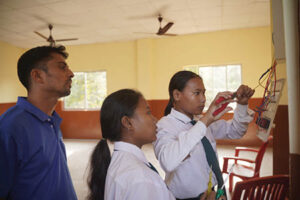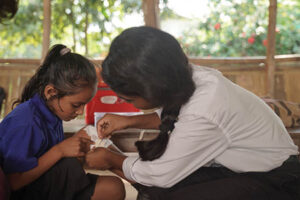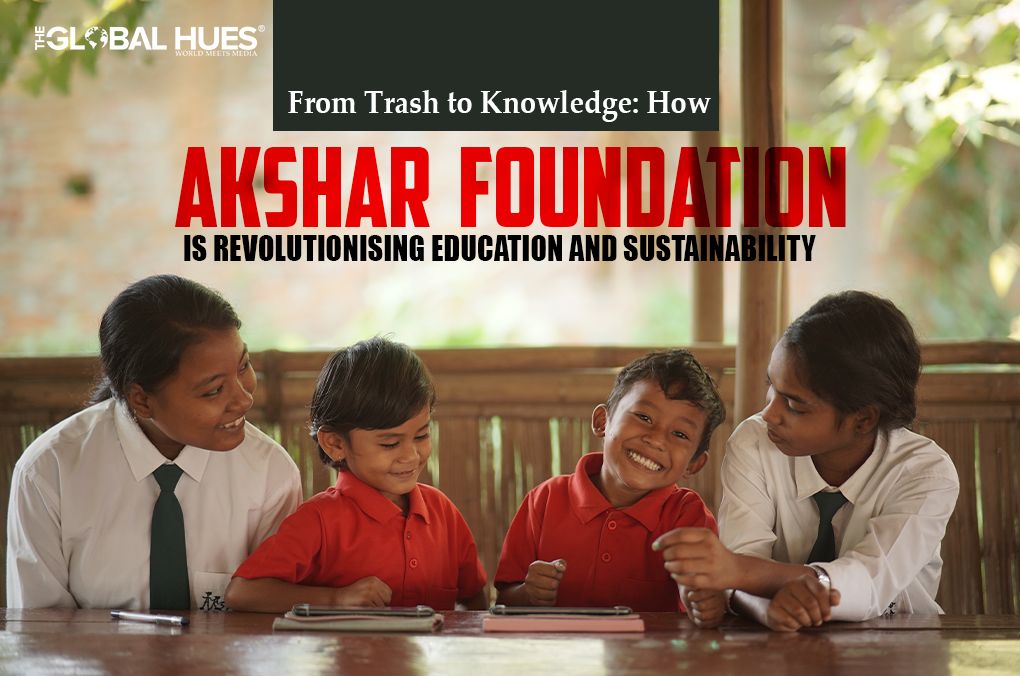Imagine a place where plastic waste is not merely a problem but an opportunity for change. Akshar Foundation, located in Assam, is an NGO that asks its students to bring plastic waste every week as fees. This may sound strange to some but this idea by Parmita Sarma and Mazin Mukhtar is bringing happiness in the lives of many underprivileged children.
Let’s hear from Parmita and Mazin themselves as they have a lot to share about the idea behind the Akshar Foundation, its long-term goals, achievements and upcoming plans.
1. How did the idea for the Akshar Foundation and the unique fee structure of accepting plastic bottles come about?
When we understood that children in poverty needed a special kind of school that would give them the skills they needed to escape poverty, we decided to make a school rooted in Mahatma Gandhi’s educational philosophy known as ‘Nai Talim’, which would teach children how to earn a living, start a business, and take care of their environment.
We started employing students in the school as many children were skipping school to perform manual labour from around 12 years of age. The older students earned some income by teaching younger children, printing worksheets, growing food, building furniture and more. This concept that we call ‘Earning and Learning’ encouraged parents to send their kids to school instead of sending them to work.

Recognising the growing problem of plastic waste, we started a campus ‘Plastic Recycling Center’, employing at-risk teens to collect plastic from nearby homes and businesses. We asked parents to segregate and send their household plastic to school but almost none of them were willing to do it, choosing instead to dump or burn their household plastic. In frustration, we told the parents that the school, which had been free so far, would start to charge school fees for uniforms, school buses, worksheets, food and more. They could pay these fees with cash or with household plastic. This decision led to an immediate shift, achieving 100% compliance from parents and the adoption of plastic waste segregation.
2. What inspired you to combine different subjects in the curriculum, such as carpentry with math and recycling with ecology? How do you believe this approach benefits the students?
Gandhiji’s ‘Nai Talim’ model calls for a focus on hands-on skill development. Western countries now call this “Experiential learning”, where learning is equally focused on practical skills as on conceptual learning. We wanted to design a school that would respect hands-on trades in addition to learning conventional subjects like Languages, Mathematics and Science.
It’s easy to incorporate conceptual learning into practical lessons. Just for doing simple Carpentry, for example, students are required to use basic Mathematics for measurement (length, angles, area, volume, etc.), otherwise, the product they make will be faulty. In the morning, they learn about the various parts of the plant, and then they observe these parts while planting and harvesting in the organic garden.
In many other schools, students often ask “Why must I learn this?”. Our students, however, don’t need to ask that question because they experience the practical use of any learning first-hand.
3. Can you describe the long-term goals and aspirations of the Akshar Foundation in terms of its impact on education and sustainability?
Our vision is a world where every child is empowered to a high-skill profession, extending beyond the select elite students who attend universities. We hope to spread our model, based on traditional Indian values, to every school worldwide, especially schools for underprivileged children.
We envision that one day, students at every school will participate in teaching younger children, building desks and benches for classrooms, creating and printing worksheets and classroom materials, growing food and cooking the school meals, making uniforms, and treating injuries of younger students, much like our students already do.

4. What are some of the most significant milestones that the Akshar Foundation has reached since its inception?
Our 100-student model school was established in 2016. In 2017, we were invited to transform a government school in Delhi. In 2018, we received Consultative Status from the United Nations ECOSOC. In 2019, our model school was lauded by the NITI Aayog, UN, World Economic Forum and covered in BBC, Forbes, TIME Magazine and more. In 2020, we entered an agreement with Samagra Shiksha Abhiyan of Assam to implement our model in government Schools throughout Assam. In 2021, we partnered with the University of Oxford in the UK to host interns for sustainable development in Assam. Recently, we received a Gold Standard award for internship excellence. In 2022, we received an award from the Government of India’s Income Tax Department for our work. Currently, we are working to implement Akshar’s NEP2020 model in 18 government schools, reaching 5,000 students, throughout Assam, aiming to reach 100 schools next year. We have also partnered with Swachh Bharat Abhiyan of Assam to begin plastic collection and recycling in private schools, with approximately 10,000 students currently participating.
5. Can you share insights into the future of education and how you envision the Akshar Foundation’s role in shaping it?
With the rise of technology and artificial intelligence, memorising facts and reciting them for exams is becoming obsolete. Schools of the future will focus on skills like coding, communication, leadership, empathy, creative problem-solving, and practical arts.
Students will no longer be seen as empty vessels to be filled with facts. Instead, they will be seen as agents of change who can make a difference in their communities even during their childhood years. We hope we can contribute our small part in bringing this vision to fruition and demonstrating the remarkable potential that children have, to effect positive change.
Read More Inspiring Stories:
- Mukta Singh: Breaking Stereotypes Of Modeling At The Age Of 58
- Meet 68-Year-Old Doctor-Model Who Is An Inspiration To Many
- Mission Milk: Helping Underprivileged Children In Times Of Hardship
- Echoes: A Cafe That Converses Without Any Language
- Lt. Cdr Bijay Nair’s Story Is About Not Quitting & Dreaming Again




